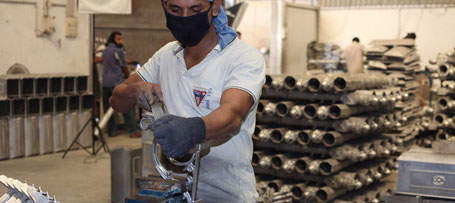
Your projected outcomes can be positively affected by the supplier of aluminum casting that you select for your manufacturing project. It is clear that the entire logic of casting aluminum involves precision, consistency, and close following of prescribed procedures. It is equally important to establish an aluminum casting supplier relationship that ensures strict internal check procedures. So you can be sure the delivered components will meet requirements and perform reliably in their applications.
The Importance of Quality Control
The systematic process of inspecting, testing, and verifying that products meet specified standards is referred to as quality control (QC). QC ensures that each aluminum casting is free from defects, is of the correct size, and maintains the specified mechanical properties. A part likely to fail might be manufactured without proper quality control, which may lead to costly delays, safety issues, or damage to your brand’s reputation.
Quality control helps to ensure against an inconsistency when working with aluminum casting suppliers. Having casting defects such as porosity, misruns, or hot tears, or surface imperfections may affect the strength of your parts. These defects can show up during assembly or maybe in entering the field, which might have passed unwitnessed till then. This necessitates the establishment of a stringent quality control system. It aims to detect these defects at a very early stage and resolve them to save time and money for the company down the line.
Why is Quality Control Critical?
1. Ensuring Product Reliability and Performance
Aluminum castings are generally utilized in very important applications, such as aerospace, automotive, and industrial machinery. In such areas, failure is not acceptable. Quality control ensures that the castings conform to very strict tolerance and performance standards. This reliability reduces the risk of product failure and avoids costly recalls or repairs.
2. Cost Savings and Efficiency
Detecting defects early on in the manufacturing method saves money on rework or scrap. A supplier who places high regard on quality control would deliver consistent products without any flaws. This consistency facilitates smoother production flows and allows for better adherence to project timelines and budgets.
3. Compliance with Industry Standards
Many industries have specific regulations and standards governing material properties, safety, and performance. Rigorous quality control ensures your supplier’s castings comply with these standards. They help you avoid legal issues and ensure your products are market-ready.
4. Enhancing Customer Satisfaction
Delivering high-quality aluminum castings improves your reputation and builds trust with your clients. Customers value products that are durable and perform as expected. Partnering with an aluminum casting supplier committed to quality control demonstrates your dedication to excellence.
Key Quality Control Measures in Aluminum Casting
- Material Inspection: Verifying raw materials to ensure they meet required specifications before casting begins. This step prevents issues caused by substandard input materials.
- Dimensional Checks: Using precise measurement tools to confirm that castings conform to design drawings and tolerances. This reduces the risk of fitment problems in assembly.
- Non-Destructive Testing (NDT): Techniques like X-ray, ultrasonic testing, or dye penetrant inspections help detect internal or surface flaws without damaging the castings.
- Mechanical Testing: Conducting tensile, hardness, or fatigue tests to verify that the castings possess the necessary strength and durability.
- Process Monitoring: Continuously observing casting conditions such as temperature, pouring times, and cooling rates to maintain consistent quality.
Choosing the Right Aluminum Casting Supplier
Not all suppliers prioritize quality control equally. It’s crucial to partner with an aluminum casting supplier who has a proven track record of rigorous QC practices. Ask about their inspection processes, certifications, and quality assurance protocols. A reputable supplier will be transparent about their quality standards and willing to provide documentation or certifications like ISO 9001.
Additionally, consider their ability to adapt QC procedures to your specific project requirements. Customized inspection plans and open communication channels can make a big difference in achieving the desired product quality.
Questions & Answers
Q1: How can I ensure that my aluminum casting supplier maintains high-quality standards?
You can ensure high-quality standards by requesting detailed information about their quality control procedures, certifications, and past project references. Visiting their facility to observe their processes firsthand or requesting sample castings for testing can also provide insight into their QC effectiveness. Building open communication and setting clear expectations from the start helps establish a partnership centered around quality.
Q2: What are the risks of not prioritizing quality control when working with an aluminum casting supplier?
Neglecting quality control can lead to casting defects, inconsistent parts, and non-compliance with industry standards. These issues can cause product failures, costly rework, delays, and damage to your brand reputation. In critical applications, such failures might even result in safety hazards, emphasizing why rigorous QC is indispensable.
